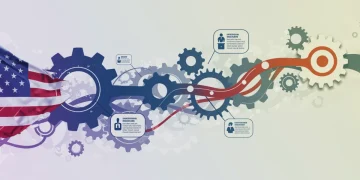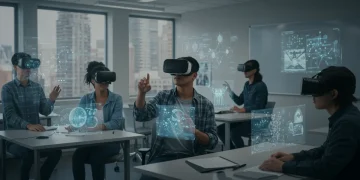AI tutors: revolutionizing personalized learning experiences

AI tutors revolutionize personalized learning experiences by adapting to individual student needs, offering tailored lessons, instant feedback, and engaging content through advanced technologies like machine learning and natural language processing.
AI tutors are shaking up the traditional learning landscape. Imagine having a personal tutor that understands your unique learning style and paces lessons just for you. Let’s dive into how these innovative tools are changing the face of education.
What are AI tutors?
AI tutors are digital tools designed to enhance learning experiences. They provide personalized support to students, adapting to their individual learning styles and needs. With advanced algorithms, these tutors can analyze a student’s performance and offer tailored exercises to help them succeed.
How AI Tutors Work
AI tutors utilize various technologies, including natural language processing and machine learning, to create effective learning environments. They can assess a student’s skills, identify areas for improvement, and offer instant feedback. This interaction fosters a proactive approach to education.
Benefits of Using AI Tutors
- Personalized learning experience that adjusts to each student.
- 24/7 availability, allowing students to learn at their own pace.
- Instant feedback on quizzes and assignments, promoting continuous improvement.
- Engaging and interactive content that keeps students motivated.
Another important feature of AI tutors is their ability to provide a wide range of learning materials. From videos to quizzes, they can present information in various formats, catering to different preferences. This flexibility makes it easier for students to grasp challenging concepts.
As technology continues to evolve, these tutors are becoming increasingly sophisticated. They are not just tools for filling knowledge gaps; they act as learning companions, guiding students through complex subjects and encouraging critical thinking and problem-solving skills. In classrooms, AI tutors can complement traditional teaching methods, allowing educators to focus on individual student needs.
AI tutors are gradually changing education and addressing gaps where traditional methods may fall short. Their capacity to foster personalized learning experiences signifies a potential shift in how knowledge is imparted across various educational settings.
Benefits of AI tutors for students
Using AI tutors offers numerous advantages that can significantly enhance a student’s learning journey. These tools bring tailored educational support directly into a student’s hands, making learning more accessible and effective.
Personalized Learning
One of the primary benefits of AI tutors is their ability to adapt to individual learning styles. They analyze a student’s progress and modify the lessons accordingly. This personalization allows students to master topics at their own pace, ensuring a deeper understanding.
Immediate Feedback
With traditional education, feedback can sometimes take time, leaving students uncertain about their understanding. AI tutors provide instant feedback on quizzes and exercises. This immediate response helps students learn from their mistakes right away.
- Boosts motivation: Instant feedback and rewards can keep students engaged.
- Encourages exploration: AI tutors allow students to dive deeper into topics of interest.
- Identifies weaknesses: These tools help spot areas needing improvement, facilitating targeted learning.
AI tutors also foster a more engaging learning environment. By incorporating gamification and interactive activities, these tools make studying less tedious and more enjoyable. Students can immerse themselves in the content, leading to better retention of knowledge.
Moreover, AI tutors are available 24/7, providing support whenever needed. This flexibility allows students to review materials or explore new topics outside of traditional school hours. It accommodates various schedules, making learning more convenient and less stressful.
As students interact with AI tutors, they also develop critical thinking and problem-solving skills. These tools often prompt students to ask questions and explore solutions, enhancing their overall educational experience.
How AI tutors adapt to learning styles

AI tutors are designed to meet the unique needs of each student. By utilizing advanced algorithms, these tutors can assess how students learn best and adapt their teaching methods accordingly.
Understanding Learning Styles
Every student has a preferred learning style, whether it be visual, auditory, or kinesthetic. AI tutors are capable of identifying these styles through initial assessments and ongoing interactions. This helps them tailor content that resonates with the student’s preferences.
Personalized Lesson Plans
Once a learning style is established, AI tutors can modify lesson plans in real-time. For visual learners, they might use graphs, videos, and images. For those who learn better through hearing, audio recordings and discussions are utilized. This personalized approach fosters a more engaging learning atmosphere.
- Visual learners: Engaging content with infographics and videos.
- Auditory learners: Use of podcasts, lectures, and sound clips.
- Kinesthetic learners: Interactive exercises that encourage hands-on activities.
Through constant feedback, AI tutors refine their techniques. They track progress and adjust methods to ensure that the student remains engaged and challenged. This iterative process helps eliminate areas of misunderstanding, making learning more effective.
Moreover, AI tutors can incorporate gamification elements, adapting challenges and rewards based on a student’s preferences. This not only enhances motivation but also keeps the learning experience fresh and relevant.
As technology continues to evolve, the ability of AI tutors to finely tune their approach to fit individual learning styles holds great potential. This adaptability is key in meeting the diverse needs of today’s students, ultimately leading to better educational outcomes.
Examples of AI tutors in education
There are many examples of AI tutors making a difference in education today. These innovative tools are helping students across various subjects and grade levels.
Duolingo
Duolingo is a well-known language learning platform that uses AI tutors to personalize lessons for users. The app adjusts its content based on the learner’s progress and adapts to the user’s strengths and weaknesses.
Knewton
Knewton offers personalized learning solutions primarily for higher education. It uses data analytics to provide customized resources, helping students understand complex topics better. This tool allows educators to track student performance in real-time.
Prodigy Math
Prodigy Math is an engaging math game that incorporates AI tutors to create a personalized learning experience for elementary students. The game adjusts challenges based on the student’s skill level, ensuring that learning is both fun and effective.
- Adaptive learning pathways: Adjusts content difficulty based on real-time performance.
- Interactive activities: Makes learning engaging and enjoyable.
- Real-time feedback: Provides instant assessment to guide student learning.
Another innovative example is Carnegie Learning, which focuses on math education. Their AI-powered platform offers personalized tutoring through interactive lessons and practice problems. The software modifies the content to fit each learner’s needs.
These examples demonstrate how AI tutors can revolutionize the educational landscape by offering tailored experiences. By using these tools, students are more likely to engage with the material and achieve better educational outcomes.
Future trends in AI tutoring systems
As technology advances, the future of AI tutoring systems looks promising. Innovations are continuously shaping how students learn and interact with educational content.
Increased Personalization
One major trend is the growth of personalized learning experiences. Future AI tutors will use even more refined algorithms to analyze student data and tailor lessons specifically for individual needs. This will allow for customized study plans that adapt in real-time based on performance.
Integration of Virtual Reality
Another exciting development is the integration of virtual reality (VR) and augmented reality (AR) into AI tutoring systems. These technologies will provide immersive learning environments, allowing students to interact with educational content in engaging ways. Imagine exploring historical sites or complex scientific concepts through VR experiences.
- Enhanced engagement: Immersive experiences can capture student interest.
- Real-world applications: Students can apply concepts in simulated environments.
- Improved retention: Interactive experiences enhance memory and understanding.
Additionally, AI tutoring systems will likely incorporate more advanced natural language processing capabilities. This improvement will enable tutors to understand and respond to student queries more effectively. As a result, students will receive clearer explanations and support that feels more like a conversation.
Collaboration will also be a key feature in the future. AI tutors may facilitate group learning by connecting students with similar goals or difficulties. This collaborative approach will enable peer-to-peer learning, enhancing social skills and teamwork.
Moreover, the integration of big data will allow for even better tracking of student performance over time. Schools and educators can use this data to identify trends and make informed decisions that benefit students on a larger scale.
Overall, the future of AI tutoring systems is bright. With advancements in personalization, technology integration, and data analysis, these systems will revolutionize the way students learn, making education more effective and accessible.
FAQ – Frequently Asked Questions about AI Tutors
What are AI tutors?
AI tutors are digital tools that personalize educational experiences for students, adapting lessons to their individual learning styles and needs.
How do AI tutors enhance learning?
They provide personalized feedback, adjust lesson difficulty in real time, and keep students engaged with interactive content.
What technologies are used in AI tutoring systems?
AI tutors often use natural language processing, machine learning algorithms, and sometimes integrate virtual reality to enhance learning experiences.
Can AI tutors replace traditional teachers?
No, AI tutors serve as supportive tools that complement traditional teaching methods, providing personalized assistance while teachers focus on broader educational goals.






